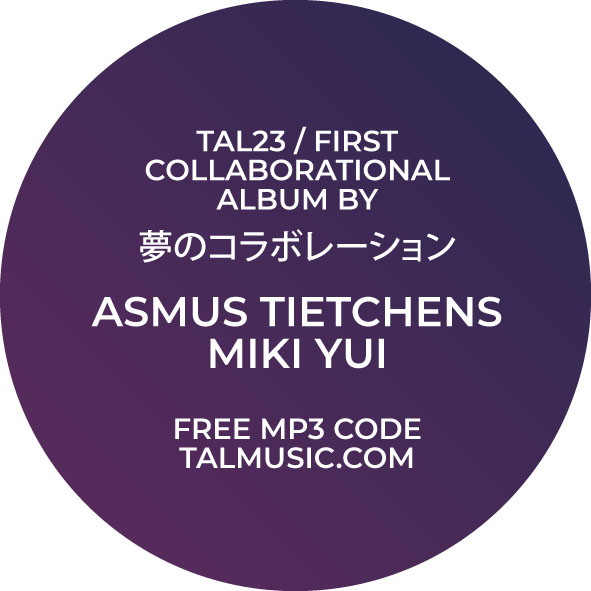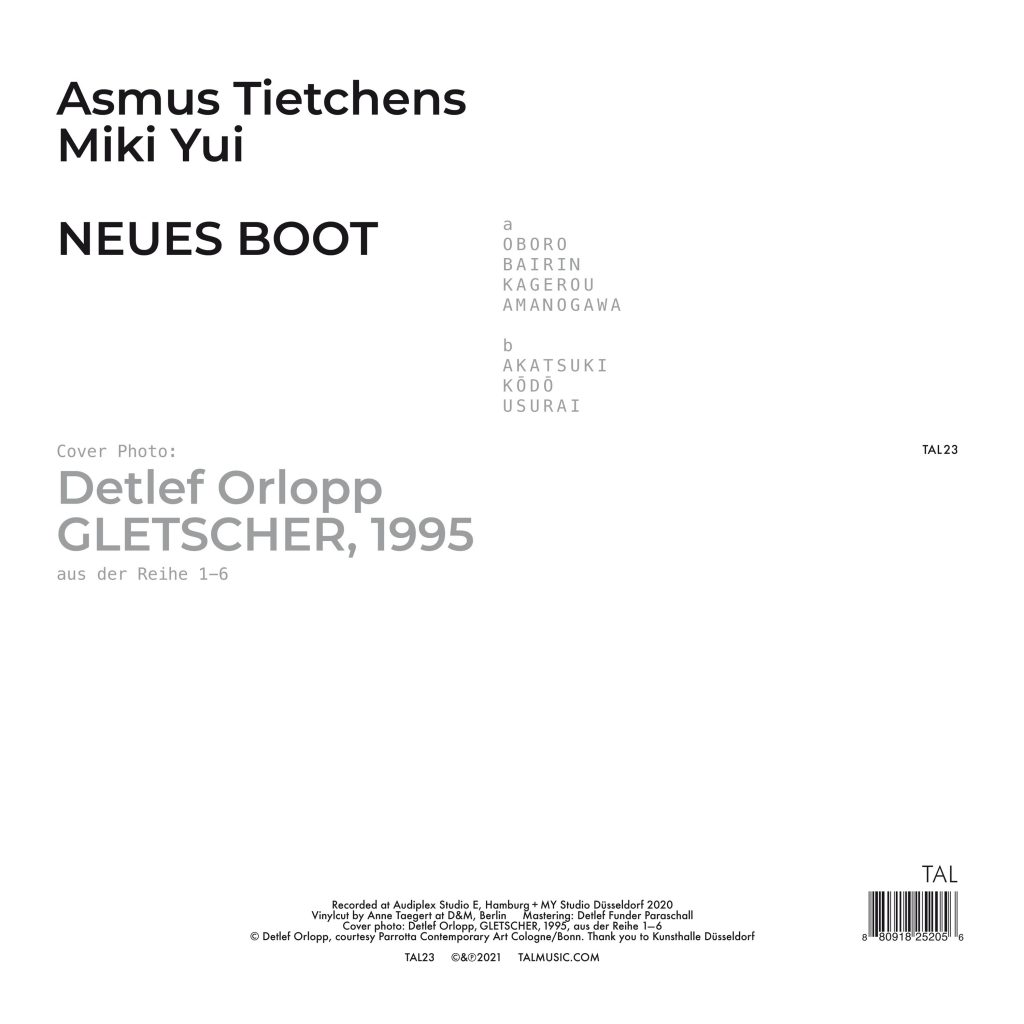TAL 23 / ASMUS TIETCHENS, MIKI YUI / NEUES BOOT

TAL23
ASMUS TIETCHENS
MIKI YUI
NEUES BOOT
LP / CD / DL
Release: 15 May 2021
Worldwide distribution: MORR/BOOMKAT/FORCED EXPOSURE
Oboro
Bairin
Kagerou
Amanogawa

Akatsuki
Kōdō
Usurai
Recorded at Audiplex Studio E, Hamburg+MY Studio Düsseldorf 2020
Vinylcut by Anne Taegert at D&M, Berlin Mastering: Detlef Funder Paraschall
Cover photo: Detlef Orlopp, GLETSCHER, 1995, aus der Reihe 1—6
© Detlef Orlopp, courtesy Parrotta Contemporary Art Cologne/Bonn.
Thank you to Kunsthalle Düsseldorf
TAL is very excited to announce the first musical collaboration between Hamburg based Asmus Tietchens and Japanese artist Miki Yui, operating out of Düsseldorf for almost 20 years now. Highly respected and hugely influential artist Asmus Tietchens first made his mark on the electronic music scene in the late 1970s, whereas Miki Yui debuted her sonic settings in1999.
Their first joint album NEUES BOOT envelops the listener with a poetic sound sensibility and a conceptual clarity which was processed and passed back and forth between their individual studios in Hamburg and Düsseldorf.
After Stefan Schneider suggested to release a Yui-Tietchens album on his TAL imprint Miki and I quickly developed some ideas towards our eventual collaboration.
We agreed upon an ongoing mutual exchange of material. We have both been very familiar with each other’s music for a long time and we found our individual approach towards sound design to be uniquely compatible. We do not use our electronic tools in order to merely achieve the maximum of technical possibilities, but to illustrate aesthetic necessities. This entails a deliberate reduction and refined perception of the sonic characteristics of the material. Only this approach enabled us to fully realise the complete spectrum of the sounds and noises we were working with in order to construct this New Boat. Each and everyone of my treatments is e x c l u s i v e l y based on a track supplied by Miki. I added no new sound sources. Naturally the spatial and temporal dimensions of the source material were thus altered. These transformations are exactly what makes our collaboration special and unique. Very early on we had agreed on New Boat as a working title and a guiding light . Of course in the beginning we had no idea where this New Boat might take us. Now we do know. After several months of ship-building the boat has now set sails for new sonic horizons. Ahoi! (Asmus Tietchens)
The title of the album as well as the individual tracks have been inspired by conversations with Asmus. When we had a chat after one of his concerts, he told me about Kōdō, the Art or the Way of the Scent. It is a 8th century Japanese incense ceremony. Very frequently the names of Japanese incense sticks are derived from natural themes, e.g. Bairin is the plum grove, the scent of the first blossom heralding the end of winter.
This poetry, the ephemeral nature of the world reminded me of Kigo, words from a Haiku (a form of Japanese poetry), which reference a particular season or a natural phenomenon. So I chose the names of the individual pieces from Kigo as if The Boat was exploring nature whilst sailing through the seasons. Only in retrospect I realised that the titles combined create this poem: (Miki Yui)
1970年代後半からラディカルな電子音楽シーンに多大なる影響を与え続けてきたハンブルグの大御所、アスムス・ティーチェンスと、東京に生まれ、デュッセルドルフにて1999年から一貫して独自のエレクトロ・アコースティックサウンドを発信するミキ・ユイの初コラボレーションアルバム。TALはこの貴重なアルバムが実現したことをとても喜ばしく思います。
繊細で詩情に溢れた楽曲からなるNEUES BOOT (新しい船)は一つのクリアなコンセプトに基づいて、ハンブルグとデュッセルドルフのそれぞれのスタジオの間で、ファイルのやりとりを重ねて構築されました。
『TALのシュテファン・シュナイダーから、ティーチェンスとユイのアルバムを出したいと打診され、直ぐにコラボレーションのアイディアが浮かんだんだ。それぞれお互いの音楽を知っていて、音に真摯に向かう姿勢に通じ合うものを感じていた。各自のスタジオからファイルをやりとりして、その音の持つ音色を最大限に活かすよう必要最低限のトリートメントを施し、音の持つ繊細な感覚の核心へと意図的に音色を削ってゆくことで、このNEUES BOOTは造られた。私は何も足さずに、ミキから受け取った音源のみを使って、その時空間を変化させることだけに集中した。まさに一つ一つの音の持つ時空間の錬金術からなるアルバムだ。当初から、NEUES BOOTというアルバム名を燈にしてコラボレーションを進めてきたが、制作中は二人ともこの新しい船がどこへ向かってゆくのかはわからなかった。数ヶ月の造船過程を経て新しい船が完成した。さあ、新しい水平線へと出航だ。アホイ!』(アスムス・ティーチェンス)
『このアルバム名と曲名は、アスムスとの会話からヒントを得たものです。
コンサートの後に、アスムスが語ってくれた香道(日本で平安時代に始まった香りを鑑賞する芸道)の話から、お香の名前が季節や自然現象から発したものが多いことを思い出し、例えば冬の終わりを微かな香りで告げる『梅林』、それは私に俳句の季語を想起させた。移ろいゆく自然から立ち上る詩情が、私たちの音楽を表わすようで、季語から曲名を選ぶことにしました。新しい船が季節を通し様々な景色の中へと探索してゆくかのように。そしてアルバムが完成して曲順も決まってから気づいたら、並んだ曲名がまた一つの詩になっていたのでした。』(ミキ・ユイ)

